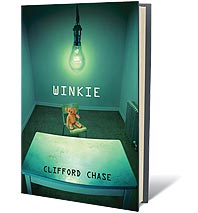
Now that Miramax has acquired a script called Homeland Insecurity, we can look forward to an off-the-news movie satire that aims at sturdier piñatas than lobbyists or American Idols. In books, it’s already been done. Winkie, Clifford Chase’s bizarre first novel, is far more than a one-note indictment of human-rights abuses. It’s also a parable, a bedtime story, and a phenomenal character study of a teddy bear.
That would be Winkie, a mangy old stuffed animal who’s mysteriously come to life. Decades after the last child in his family had grown too old to play with him, he hopped off his shelf and into the woods. But one night, a swat team visits his lonely cabin, takes him into custody, and arrests him on 9,678 charges, including terrorism, treason, “corrupting the youth of Athens,” teaching evolution, and being a witch.
Allegorical satire is tricky business. It’s hard to inspire moral outrage and laughter all at once, and Chase isn’t infallible on this point: He can be cutesy at times and hectoring at others. But what bails him out is his indifference to the trial itself. It’s easy to imagine critics comparing this book to Kafka’s Trial, but it’s more reminiscent of that great allegorist’s animal stories. (Famous for writing about a man-bug in existential crisis, he also depicted a singing mouse with a diva complex, a dog detective, and an overcivilized ape.)
Early on, Winkie ponders how “his soul seemed to have been gathered together along with these minute fibers. Was this abnormal? Was it magic?” If humans can have souls, why not Winkie? His story reflects Chase’s upbringing, as detailed in his memoir, The Hurry-Up Song. Chase’s older brother—his great solace when the two were growing up gay in suburbia—later died of aids. In light of Winkie’s long-locked-in state and his indeterminate gender (he was once female), the charges against him take on a new dimension.
Winkie’s testimony at trial is not a political counterattack, though, but an Edenic memory: “There were two little bears then, large and small. They didn’t know why, but each day cloth and stuffing looked and found its own.” In this passage, it comes together that Chase is writing a fairy tale for adults. His epigraph quotes Bruno Schulz: “The books we read in childhood don’t exist anymore … Whoever still has in him the memory and marrow of childhood should rewrite these books as he experienced them.” Too often, a fascination with childhood and naïveté turns cloying, as in the sillier elements of McSweeney’s. But that’s because some of those writers deliberately sidestep serious questions in their war against literary pretension. Chase is doing the opposite. He has remembered those books from his youth well, but he writes them as we experience them now—knowing all we know, joy and freedom, but torment, grief, and injustice, too.
Winkie by Clifford Chase. Grove Press.
